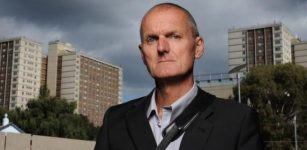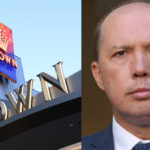Police Against Drug Prohibition: An Interview with LEAP’s Greg Denham

In 2001, the Uniting Medically Supervised Injecting Centre (MSIC) was established in Sydney’s Kings Cross, in response to a spate of heroin overdoses. Ten years on, studies found that the facility had been a resounding success.
Ambulance call-outs were down by 80 percent. Public injecting and discarded syringes had halved. Robbery and property offences had fallen and there was no increase in drug offences.
Dr Marianne Jauncey, the medical director of the centre has pointed out that there’s never been a fatality from an overdose in the 90-odd supervised injecting centres around the world.
The need for more safe injecting facilities
Despite the success of the MSIC, it’s still the only facility of its kind in Australia. But there are calls by prominent members of the community for more safe injecting facilities to be established around the country.
Former Victorian state premier and now chairman of mental health organisation beyondblue, Jeff Kennett is a key advocate for a supervised injecting room in Victoria. One of the areas slated for such a facility is North Richmond, and leading the push for this establishment is harm reduction expert Greg Denham.
The former police officer turned harm reduction advocate
Interestingly enough, Mr Denham is also a former police senior sergeant, who served on the Victoria police force for fifteen years and also served in Queensland for two.
He now advocates for a different approach to dealing with drugs, one that doesn’t involve locking up those who’ve been found in possession of illicit substances for personal use.
And Denham’s not the only former law enforcement officer questioning the punitive approach that authorities are taking towards drugs in this country.
He’s not the only one
As Greg has pointed out, former Victoria police chief commissioner Ken Lay said, “We can’t arrest our way out of this issue”, while former Australian federal police commissioner Mick Palmer has called for a policy change in his role with Australia21.
Denham is the Australian representative for the US-based agency Law Enforcement Against Prohibition (LEAP). LEAP is an international group of police officers and other members of the criminal justice system that want to see an end to drug prohibition.
His work on the ground
The ex-police officer has been working in the field of harm reduction for over twenty years. He was involved in setting up an access program for Naloxone – a drug that reverses opioid overdoses – in Victoria, as well as introducing needle and syringe dispensing machines around the Melbourne metropolitan area.
His work has also taken him to developing countries – such as Vietnam, China and Myanmar – where he worked with local law enforcement agencies advocating for the introduction of harm reduction initiatives. These have included needle and syringe, methadone and condom programs.
Sydney Criminal Lawyers® spoke with Greg Denham to find out how a police officer with seventeen years on the force comes to find himself to be one of the country’s leading harm reduction advocates.
Greg, you’re one of the major advocates behind a push to establish a medically supervised injecting centre in North Richmond. How is this going? And why is it needed?
North Richmond and Abbotsford is the part of Melbourne which has had an active drug street market for over a decade. It has people coming from all over Melbourne to buy and use drugs, so we have a very active injecting drug using population.
Many of them are quite disadvantaged, street-based and chaotic in their drug use. They inject in public and are affected by drugs. They leave their needles and syringes around everywhere. They are very hard to connect with services. And people see them using drugs.
We think that if you look at the criteria for an injecting room – particularly a very active and extensive street drug market – then North Richmond and Abbotsford meet all of them.
We’ve been advocating for this for well over ten years now and we believe the street drug market isn’t going to go away, despite intensive police operations. And an injecting room, or a consumption room, is needed badly down there.
In May 2011, the local council voted six to one in favour of trialling such a facility. But this has never happened. What’s preventing it from happening?
There’s been no state government support. So state government support would be needed to change some of the legislation around how consumption rooms or supervised injecting facilities work. That helps to clarify the law, particularly in terms of how police respond to those injecting facilities, as they have in New South Wales.
So the state government hasn’t given support for the idea. We’re still advocating and working with the government. We know we have some support within it. But I think, we just need to keep pushing the issue, raising awareness and building our case for this particular type of approach.
What sort of impact would the injecting room have for those using drugs in the local area and the broader community in general?
We had a case before the coroner at the end of last year, when a young woman overdosed and died in North Richmond in May. She actually overdosed in a Hungry Jack’s toilet and was taken to hospital where she died. We believe that by introducing a supervised injecting facility we would stop overdose deaths.
There are forty that are directly or indirectly related to that area each year, we can estimate. The Coroner’s Court has informed us that they think there’s about forty or more overdose deaths that are related to that area. So we would stop these.
We would stop overdose in public. There wouldn’t be drug-affected people in public. Needles and syringes wouldn’t be left lying on the street, so that kind of public amenity issue would be addressed.
People who go into the injecting room would be provided with a range of programs that would enable them to go into treatment or housing or employment, or just other kinds of social welfare and health referrals.
Those outcomes – which have been researched and are evidence-based on the nearly one hundred injecting and consumption rooms that are based throughout the world – have been well documented and we believe that would be the case in North Richmond and Abbotsford.
You’re a former senior sergeant and yet you advocate for the decriminalisation of drugs. How does someone who used to be on the force come to hold such a divergent view from that held officially by police?
Police hold the view of the government. So when police talk about drug policy, they’re reflecting or mirroring the government view.
I found in my time with police that I started to question drug policy. I questioned drug prohibition. I felt that we were just doing the same thing over and over again, and getting nowhere.
In fact, the only people that were actually profiting from drug prohibition were the drug dealers, who use drug profits to do other illegal things. And as I’ve said before, my work in Southeast Asia and other countries around the world, and Australia as well, has basically revealed to me that illicit drug money is used to corrupt police and public officials. And it legitimises many criminal elements within the community as well.
My views started to change when I started to realise that we were just hitting our heads against the wall – doing the same thing over and over again – expecting to get a different result. Every time police would stand in front of a big seizure of drugs and money, saying, “This is going to make a huge impact on the illicit drug trade,” I recognised after a while that that wasn’t the case.
It wasn’t making a huge impact, in fact, it was making the situation worse. Not intentionally, but certainly if you look at when a drug becomes less available the purity goes down, the price goes up, people will use another type of drug and then crime will go up.
So I thought, well drug policy really isn’t working. It hasn’t been working for quite a long time. So my view was – after researching and talking to experts in the field – that we needed to change our drug policy.
You mentioned decriminalisation. I also looked at some of the work that’s done in the UK from an organisation called Transform, which is heavily promoting the regulated and controlled availability of drugs.
And after researching it and looking around, I found that there were police such as myself in countries such as the United States, England and other places saying the same thing.
What’s the alternative that you’re advocating?
Firstly, we need to look at a decriminalisation approach. We need to look at what’s happened in Portugal. Portugal has done an outstanding job over the last sixteen years, as they’ve decriminalised all drug use.
They basically now see drug possession for personal use as a health issue. If you get caught there, you go before a “dissuasion committee.” In most cases, they recognise that people who use illicit drugs – which is the case here by the way – do so relatively without difficulty or harm, without damage to themselves or others. They use a drug relatively safely.
They recognise that so most people receive some education.
The Portuguese took money out of policing and the criminal justice system and they put it into health, education and employment. They completely changed their drug policy around and it’s been shown to work in terms of reducing crime, reducing death and blood-borne viruses and getting people into education and health programs.
That’s the way we need to go now. We need to do that immediately. And in the future – particularly for drugs, such as cannabis and ecstasy – there’s no reason why we can’t have a regulated and controlled environment, where we actually produce those drugs and sell them to people.
Many in the community would cringe if it was suggested that a drug like heroin might be decriminalised. But you’ve seen alternative ways of dealing with this drug overseas. Can you outline what you’ve seen?
In places like Switzerland and the Netherlands – and now in Denmark and Canada – the availability of heroin, in terms of a prescribed heroin, is a policy that’s been running for a long time.
And what happens is, if you’re a person who’s dependent on heroin and you’re having problems with your use, you can be prescribed heroin and that way you get a regulated, clean dose. You don’t have to commit crime to get your drugs. There’s no black market.
There’s obviously a lot of fear about heroin. It is very addictive. But we also recognise that the majority of harms that come from heroin use come from the fact that it’s illegal, particularly in terms of crime and sex work.
And people use heroin for a particular reason. A lot of people use it because they’re trying to regulate their emotions. It’s self-medicating. A lot of people who use heroin and have become addicted to it, do so because of trauma – experiences when they were young. So it’s certainly a mental health issue as well.
So let’s get people into a prescribed program for heroin. Get them into that kind of treatment program. And let’s deal with their other issues. Because too often we just focus on the drug. We don’t focus on the person who is using the drug and their issues and why they’re becoming dependent.
But you’re not the only ex-police officer advocating for an end to the war on drugs. You’re the Australian representative of LEAP. Can you tell us about this organisation?
LEAP started in the United States about fifteen years ago, when a group of police got together informally and started chatting about life in the job. They started talking about drug policy, how it wasn’t working and how it was only getting worse. And the war on drugs – which Nixon had declared back in 1971 – had become a total catastrophe.
So they formed LEAP – Law Enforcement Against Prohibition. They recognised that prohibition was more harmful than the drugs themselves. It was a pretty tough call because when you’re in policing there’s a sense of camaraderie. You work in an organisation that is pretty tight-knit. So to go outside that and say that isn’t working, is a pretty big call.
There was a lot of courage and leadership shown. And it grew from there. More police started to stick their hand up and say, “We know this isn’t working.” Then the UK came on board and then down in Puerto Rico and South America. So it’s growing steadily.
I became involved because I had similar thoughts. I don’t like the trillions of dollars that are being spent on the war on drugs every year.
And to speak out against that war on drugs is a big call, because there’s a lot of benefit and a lot of investment in the war. And police are one of the main beneficiaries if you consider how much is invested in resources, in police numbers, powers and equipment.
In terms of the way in which police work, that’s all stuff that’s readily accepted. It doesn’t mean to say that we are necessarily gaining ground or having any positive outcomes.
In fact, people from LEAP argue that there’s more harm from drug policy, than from drugs themselves.
We’re on about raising awareness and saying, “Look, the police that are actually fighting this are the ones that are now saying that it’s not working and we need to change things.”
And lastly, another tragic drug-related death occurred at a music festival on the Queensland-New South Wales border. This led to renewed calls from harm reduction experts for the establishment of a pill testing program. But NSW police minister Troy Grant has once again stated that his government wouldn’t consider such an initiative.
What is your take on pill testing and the reluctance of state governments to implement such a program?
It’s a legitimate harm reduction approach. Again, it’s been used overseas in Europe and it’s quite successful. And it doesn’t lead to increased drug use. It doesn’t condone drug use. It doesn’t do all of those things that Mr Grant and others are saying it does.
Basically, what happens is that people go to an event and if they do have a substance on them, they can go to a place where they get it tested.
They get it tested properly. They don’t just get a scraping to see what type of drug they’ve got. It gets properly tested to show the full spectrum of substances in that drug, which can show you if it’s got something harmful in it. And most people, when they find that out, get rid of that drug.
It makes a lot of sense. It’s common sense. It’s research and science-based. And we need to do it now. People who go to these events, they want to use a substance, which they know is safe. And pill testing – substance testing – is a way in which that can happen.
Greg thank you very much for speaking with us today. And best of luck with your work and the continued push to establish the safe injecting room in North Richmond.
Thank you.







